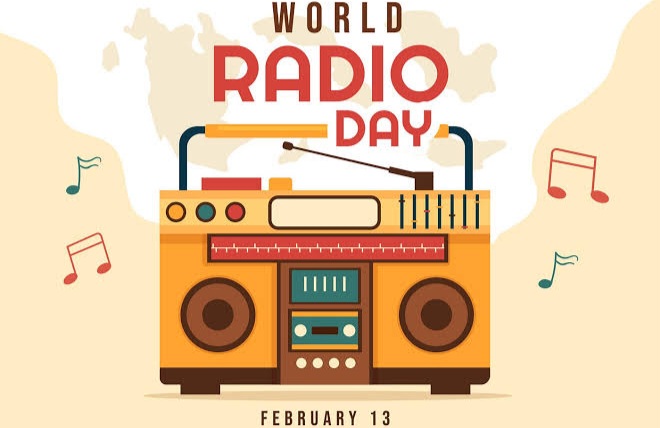 By Gbemiga Bamidele
By Gbemiga Bamidele
UNESCO World Radio Day is a global celebration of radio and how it shapes our lives. Radio informs, transforms and unites us.
Radio brings together people and communities from all backgrounds to foster positive dialogue for change. Consequently, February 13th is a date proclaimed by UNESCO to celebrate radio broadcast, improve international cooperation among radio broadcasters, improve and encourage decision makers to create and provide access to information through radio.
The theme for World Radio Day 2025 is “Radio and Climate Change”.
World Radio Day celebrates the many opportunities that radio broadcasting brings for giving prominence to climate change issues. The year 2025 marks a pivotal year for climate change. In accordance with the Paris Agreement, if humanity is to limit global warming to 1.5°C, greenhouse gas emissions must peak by the year 2025 to at the latest, before they begin to fall.
 The Paris Agreement, also called the Paris Climate Accord, is an international treaty on climate change that was signed in 2016. The treaty covers climate change mitigation, adaptation and finance.
The Paris Agreement, also called the Paris Climate Accord, is an international treaty on climate change that was signed in 2016. The treaty covers climate change mitigation, adaptation and finance.
The Paris Agreement was negotiated by 196 parties at the 2015 United Nations Climate Change Conference near Paris, France.
Nigeria signed the agreement in September 2016 and ratified it in March 2017. As at February 2023, 195 members of the United Nations Framework Convention on Climate Change (UNFCCC) are parties to the agreement to support radio stations in their journalistic coverage of this issue. World
Radio Day on February 13, 2025 is dedicated to Radio and Climate Change in the Age of Artificial Intelligence alongside ubiquitous social networks.
Quality radio is still universal and popular, considered to be the most reliable medium. Beyond popularizing environmental concepts by broadcasting verified information independent of economic, ideological and political powers, radio can influence listeners’ perception of climate change and the importance attached to the subject. Radio can help shape the public agenda, with the potential to influence public affairs.
In these dynamics, there is a big significant contribution from information sources to the definition of the radio programming themes and editorial approach. The sources are indispensable for gathering and understanding climate and scientific data. The selection and prioritization of themes and the framing of editorial content will largely be the result of these exchanges between sources and the broadcaster.”
 The scarcity of financial resources for radio stations in recent times due to the loss of advertising or public funds has led to the forced reduction of staff and the increased cost of resorting to sources to obtain verified information, particularly costly for local radio stations. However, consultation of a variety of sources is pivotal to reports on climate change. Broadcasters need to pay closer attention to the quality and diversification of information sources as their weight has increased in the treatment of climate change-related information.
The scarcity of financial resources for radio stations in recent times due to the loss of advertising or public funds has led to the forced reduction of staff and the increased cost of resorting to sources to obtain verified information, particularly costly for local radio stations. However, consultation of a variety of sources is pivotal to reports on climate change. Broadcasters need to pay closer attention to the quality and diversification of information sources as their weight has increased in the treatment of climate change-related information.
Deconstructing the argument of climate skeptics, taking stock of greenwashing, deciphering the economics of ecology, reporting on the divergent treatment of climate activists, investigating the lack of action or the obstacles to solutions, all require expert, diverse and reliable sources. The foundation of the editorial independence of a radio station, an essential condition to provide a service of public interest, is free information as much detached from the interest of companies and politicians as from the actors of institutional life and the consulted sources. Listeners have a wealth of knowledge about the realities of climate change and possible solutions, particularly people from rural communities and indigenous people or those who have experienced environmental disasters in specific localities, such as pollution from industrial sites, climate-induced food shortages, untreated waste water etc.
A vivid example of this is the devastation of Taraba Yam farmers, by climate change-induced heat waves that was reported by the Premium Times of January 12, 2025. The report draws the link between extreme heat and farm productivity. “When plants are subjected to high temperature for a long time, they might experience stress. If farmers don’t take precautions against high temperatures, heat stress have negative effects on plants and reduces harvest. Heat stress triggers dehydration in plants which stunts their development. It leads plants to lose water and wilt” the report concluded.
Local radio stations anchored in their communities have the greatest potential to offer programs coverage, interviews highlighting real-life situations and solutions shared by residents. Their words illustrated daily life in the group of climate change. In tune with the theme for this year, World Radio Day, a commensurate example is a radio Nigeria’s Broadcasting house.
Enugu Weekly Radio Show Climate Change by Ekene Odigwe who is a popular presentation by Radio Nigeria, Nigeria’s first national radio station. Every Monday, Odigwe uses the radio to advocate for positive action on climate change in Nigeria.
Odigwe’s radio program focuses on raising awareness on climate change issues as a way of calling for urgent steps to reduce the societal impact of climate change in Nigeria. Thanks to radio, women, children and marginalized people who are greatly affected by climate change can find a platform to tell their stories, share their knowledge and learn new ways of doing things. In providing solutions and know-how on climate change, it also seems essential to recognize the specific place of radio programs produced by indigenous peoples.
In the event of environmental disasters, radio often becomes the only source of information and support for populations as it operates even without electricity or internet, can reach a very large number of people at the same time and is not affected by terrestrial or satellite distribution programs. In this way, broadcasters maintain the communication system that saves lives in emergency situations.
In the past 15 years, 44 journalists have been killed and 749 attacks recorded in 59 countries. Over 70% of surveyed journalists said they had been attacked, threatened or pressured. Of them, 60% reported online harassment, 41% had been physically assaulted, 25% said they have been legally attacked and 75% said it has had an impact on their mental health. Consequent upon above, the topic for discussion and concern is the importance of safety of journalists who inform the public about climate change, including the challenges they face.
The spread of misinformation and disinformation on climate change is a growing challenge, reinforced by the multiplication of voices expressing themselves on the subject. Notably, through social networks, radio broadcasters as vectors of credible, sourced and verified information are thus essential to expose false news. The bond of trust that binds them to their listeners makes their programming a privileged space for raising awareness of climate change, environmental issues and natural disasters.
World Radio Day 2025 celebrates radio broadcasters’ efforts to equip citizens with the competencies they need to better understand and tackle the climate crisis.
Gbemiga Bamidele, Ph.D is the Convener, Society for Journalism Enhancement Initiatives (S4JEI)





